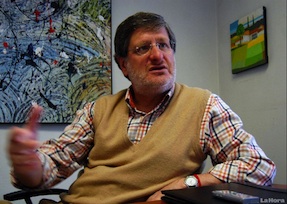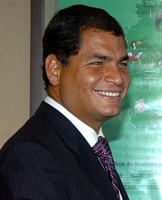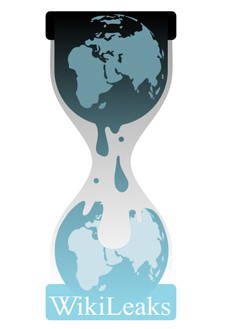 Entrevistamos a Francisco Carrión, diplomático y analista político ecuatoriano. Fue Ministro de Relaciones Exteriores de Ecuador y en su carrera en el exterior pasó por las embajadas de París y Londres, siendo nombrado embajador en Madrid. Tras su renuncia como jefe de la misión ante las Naciones Unidas dejó la profesión para ser profesor en la Universidad FLACSO en Quito.
Entrevistamos a Francisco Carrión, diplomático y analista político ecuatoriano. Fue Ministro de Relaciones Exteriores de Ecuador y en su carrera en el exterior pasó por las embajadas de París y Londres, siendo nombrado embajador en Madrid. Tras su renuncia como jefe de la misión ante las Naciones Unidas dejó la profesión para ser profesor en la Universidad FLACSO en Quito.
 "Catbird seat", noun: "an advantageous situation or condition"; "sitting pretty". This North American idiom readily applies to the current position of Ecuadorean President Rafael Correa, who was hoisted into the international spotlight when he recently became host to Julian Assange. As a result Correa has raised the global profile of his small nation of 14 million, and the tens of thousands of letters received by his embassy in the past ten days indicate that granting Assange asylum would instantly make him a global hero. With little economic dependence on the U.S., and with Assange at his disposal, Correa potentially holds significant leverage over Washington.
"Catbird seat", noun: "an advantageous situation or condition"; "sitting pretty". This North American idiom readily applies to the current position of Ecuadorean President Rafael Correa, who was hoisted into the international spotlight when he recently became host to Julian Assange. As a result Correa has raised the global profile of his small nation of 14 million, and the tens of thousands of letters received by his embassy in the past ten days indicate that granting Assange asylum would instantly make him a global hero. With little economic dependence on the U.S., and with Assange at his disposal, Correa potentially holds significant leverage over Washington.
Late Night Live Radio had Thiago de Aragao and Donald Rothwell on the program 26 June 2012 to discuss Julian Assange and his application for political asylum in Ecuador. Full audio is available at the ABC Radio website.
This is part of our live-coverage on Julian Assange's request for political asylum. The most recent news is available here. See the archives for coverage of previous days.
Follow @wl_central on Twitter for all the latest updates.
WikiLeaks announced via Twitter on the evening of June 19 (19:40 local time) that Julian Assange has requested political asylum at the Ecuadorian embassy in London.
This is part of our live-coverage on Julian Assange's request for political asylum. The most recent news is available here. See the archives for coverage of previous days.
Follow @wl_central on Twitter for all the latest updates.
WikiLeaks announced via Twitter on the evening of June 19 (19:40 local time) that Julian Assange has requested political asylum at the Ecuadorian embassy in London.
Julian Assange arrived at the Ecuadorian Embassy in London on June 19 to apply for political asylum. Since then, there has been mass coverage by the media, which often contains false and misleading information about his reason for applying, the threat he faces in the U.S., and the reaction from his supporters.
This is part of our live-coverage on Julian Assange's request for political asylum. The most recent news is available here. See the archives for coverage of previous days.
Follow @wl_central on Twitter for all the latest updates.
WikiLeaks announced via Twitter on the evening of June 19 (19:40 local time) that Julian Assange has requested political asylum at the Ecuadorian embassy in London.
This is part of our live-coverage on Julian Assange's request for political asylum. The most recent news is available here. See the archives for coverage of previous days.
Follow @wl_central on Twitter for all the latest updates.
WikiLeaks announced via Twitter on the evening of June 19 (19:40 local time) that Julian Assange has requested political asylum at the Ecuadorian embassy in London.
This is part of our live-coverage on Julian Assange's request for political asylum. The most recent news is available here. See the archives for coverage of previous days.
Follow @wl_central on Twitter for all the latest updates.
WikiLeaks announced via Twitter on the evening of June 19 (19:40 local time) that Julian Assange has requested political asylum at the Ecuadorian embassy in London.
This is part of our live-coverage on Julian Assange's request for political asylum. The most recent news is available here. See the archives for coverage of previous days.
Follow @wl_central on Twitter for all the latest updates.
WikiLeaks announced via Twitter on the evening of June 19 (19:40 local time) that Julian Assange has requested political asylum at the Ecuadorian embassy in London.
Julian Assange interview on ABC Radio National Breakfast, 21 June 2012. This is his first interview conducted since he applied for political asylum in Ecuador. At the time of this interview, Mr Assange had been at the Ecuadorian Embassy for three days. Full audio is available at the ABC Radio website.
This is our live-coverage on Julian Assange's request for political asylum. See the archives for coverage of previous days.







This is a "WikiLeaks News Update", a daily news update of stories that are obviously related to WikiLeaks and also freedom of information, transparency, cybersecurity, and freedom of expression. All the times are GMT.
- New Cables were released yesterday and today.
06:45 PM Newspaper El Comercio reports on a cable dating from 2006 revealing how then Ecuatorian Presidential candidate Xavier Neira’s visa was revoked by the United States as he was involved in a legal battle against Pfizer.
06:35 PM Hacktivism’s Global Reach: Peter Fein of activist group Telecomix and Gabriella Coleman interviewed on Democracy Now!.
05:50 PM Macbeth is quoted in a cable regarding Dominican Republic’s 2004 Presidential election, titled ‘Balaguer’s ghost’. The passage refers to Joaquin Balaguer’s ‘repeated manipulation of elections to ensure his own continuation’ (he was elected President in three different occasions) in comparison to then president Hipolito Mejia who was trying to lift the constitution ban on reelection and undertook similar efforts to stay in power.
According to the cable, ‘influential, sophisticated business executives’ warned the U.S. Ambassador that if the ruling party PRD (Meija’s Dominican Revolutionary Party) won the 2004 elections there would be ‘civil war’.
Over the past few years, the international left has derived much satisfaction from the course of South American political and economic integration. The novelty of such integration is that it has proceeded along progressive lines and has been pushed by regional leaders associated with the so-called "Pink Tide." With so many leftist leaders in power, it is plausible to surmise that a left bloc of countries might challenge Washington's long-term hemispheric agenda. Yet, behind all of the lofty rhetoric and idealism, serious fissures remain within South America's leftist movement, both within individual countries and within the larger regional milieu.
That, at least, is the impression I got from reading U.S. State Department cables recently declassified by whistle-blowing outfit WikiLeaks. Take, for example, the Luiz Inácio "Lula" da Silva administration in Brazil, which at times encouraged a "hostile" climate against the Free Trade Area of the Americas or FTAA, a corporately-sponsored plan backed by Washington, while on other occasions encouraging "public doubt and confusion through its own often-conflicting statements" about the accord. Behind the scenes, the Brazilian government was much more divided on the matter than commonly portrayed, torn between its South American loyalties on the one hand and the desire to gain access to the lucrative U.S. market for agricultural and industrial goods on the other.
Theme by Danetsoft and Danang Probo Sayekti inspired by Maksimer